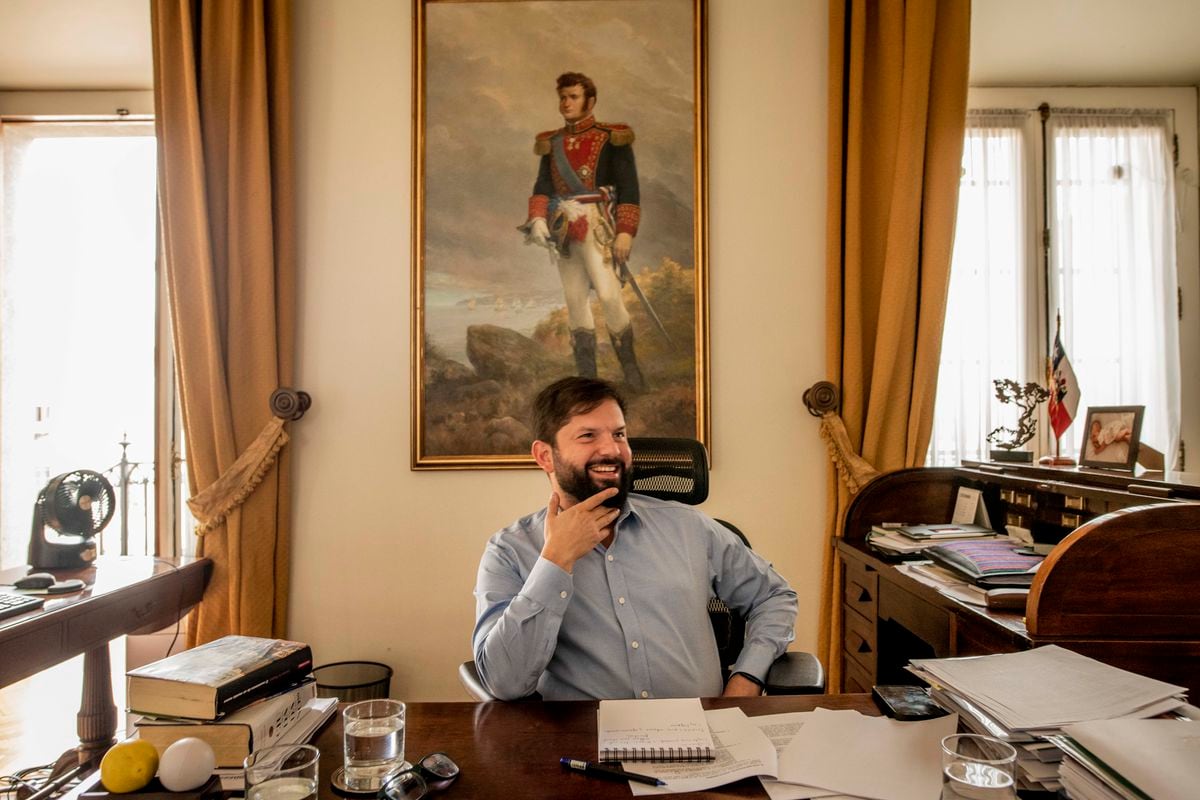She is the first communist minister to reach the Labor portfolio from the Government of Salvador Allende.
Jeannette Jara (Santiago de Chile, 48 years old) entered the front line of politics on March 11, when she was summoned to the Cabinet by Gabriel Boric.
From this portfolio, she pushes one of the main campaign promises of the left-wing president: to improve the pensions of Chileans with the pension reform presented to Congress a few weeks ago, which contemplates the end of the Pension Fund Administrators (AFP).
A member of her party since high school, she lived in her childhood and adolescence in a popular municipality of Santiago, Conchalí, as the daughter of a mechanical worker father and a housewife mother.
She was the first in her family to turn professional.
When the conversation moves towards the political and technical aspects that he must face in his portfolio, Jara asks to go back to the beginning, to his origins: “When I am here with the responsibility that the president gave me, I think about people's daily lives.
And I do that with my heart and head set on Conchalí”.
Ask.
His dialogue profile has been highlighted and it is repeated —perhaps to his irritation— that he appears not to be a communist.
What does she think?
Response.
They have told me.
There is a lot of prejudice regarding how we communists are.
We are part of a political party that pursues an idea of transforming Chilean society, but it is not a regiment and, obviously, we are not all the same.
But I take it as an opportunity to debunk myths.
They are caricatures that were imposed since the dictatorship, that we are angry leaders.
Q.
You laugh a lot…
R.
But I take inequality very seriously and, therefore, although I am very happy, I do not lose a second in the struggles that must continue to be carried out.
The structural inequality of Chilean society is so serious to address that it requires a lot of political dialogue in order to make the changes viable.
Q.
Does that imply giving up?
It is up to you to negotiate key axes of the Government, such as pensions...
A.
First, establish relationships of trust.
Then, speak candidly and transparently, even with someone with opposing views.
And the third: have tactical flexibility.
There are important final objectives and along the way you must, by the way, collect ideas from others.
In pensions, the law with which we seek to reduce work to 40 hours a week and in other structural projects, the debate is enriched by the ideas of others.
Q.
It has been written that in recent months you have made "unexpected allies", such as certain business leaders...
R.
It was thought that because he was a communist he would not be able to work with employers and businessmen.
Again, there were certain preconceptions.
Although we have different positions, there is a conviction among both employers and workers that Chile, as of October 2019, with the outbreak, manifests pain that must be recomposed with greater justice and social cohesion.
Q.
How important is the reduction in weekly work hours for workers?
R.
There are many theoretical discussions, but if one sees that people travel more than an hour and a half by bus to get to work and this law would allow them to sit down, they have another perspective on things.
If a woman can leave her children awake and not asleep before going to work, the same thing.
When formulating public policies, it is always necessary to take into account how this impacts in real life.
We hope to approve it between now and January.
Q.
What did it mean for the Government that on September 4 Chile rejected the proposal for a new Constitution?
R.
The president has told us that we must take care of the urgency of people's lives, but, at the same time, to carry out a transformative agenda and be able, from this left-wing government, to comply with what has been committed.
Q.
The pension reform proposal appears at a time when, in the opinion of many, the Government was immobilized after the plebiscite...
R.
It is a dynamic proposal.
Our current pension system has a central trunk, individual capitalization managed by private companies, the Pension Fund Administrators (AFP).
In this sense, the concept of social security does not exist and a kind of private insurance takes precedence where each older person has to assume the costs of aging, not from a collective perspective.
This gave rise to an important power, the AFPs, which were installed without a democratic context and without any type of freedom of choice for workers.
The changes that have been tried to be made since 2008 have integrated elements of solidarity charged to taxes, but today the challenge we have is to include elements of social security.
Q.
The proposal includes social security with an additional 6% contribution charged to employers...
R.
Until recently there were conflicting versions about which is the most appropriate path.
And I say until recently, because today only those who are at the extreme think that the only solution is still the AFPs.
Even on the right there is a perception that if we want to have different results we must do things differently.
Now how different?
How much solidarity?
In how many years?
How?
It is part of the debate that we are carrying out in Parliament.
Q.
What is the horizon?
R.
Improve pensions and, in particular, those of women.
Join a system that has social security.
If a 30-year-old person today saves 10% and tomorrow the employer places 6% on him, at age 60 he will have more than if he had continued with only 10%.
But she will continue to run the risk of aging on her own.
It is necessary to think that until the age of their retirement there are entire generations of pensioners and of people who are going to retire who cannot be sacrificed.
In a country where 72% of retirements are below the minimum wage, the project seeks to recognize retirees, charged to social security, for the years they contributed.
For future retirees, charged to social security, at least a minimum pension floor.
A book on the current Chilean pension reform, with notes and notes in the office of the Chilean Minister of Labor, Jeannette Jara.sofia yanjari
Q.
The debate on the destination of that 6% should go to individual accounts or social security is cross-cutting…
R.
It is very contradictory that we talk a lot about solidarity, but we always think that others show solidarity with us and not the other way around.
But each of the contributors will receive the benefits of social security.
Q.
Is the existence of social security tradable for the Government?
R.
That would mean that the increase in pensions would take 40 years and that is not possible for this government.
Q.
Is it a radical reform proposal?
R.
This reform proposes a mixed system, where 83% of the OECD countries are.
And what he seeks, rather, is to get us out of the radicalism in which we have been for 40 years.
In pensions, Chile has a historic opportunity that cannot be missed.
Subscribe here to the EL PAÍS America newsletter and receive all the latest news in the region.
Subscribe to continue reading
Read without limits
Keep reading
I'm already a subscriber

/cloudfront-eu-central-1.images.arcpublishing.com/prisa/Y44IXC2UKVBVXK2D4NK72IOINU.jpg)







/cloudfront-eu-central-1.images.arcpublishing.com/prisa/4PKPLHZOXBG5TEAQ6JNDTUJXBA.jpg)